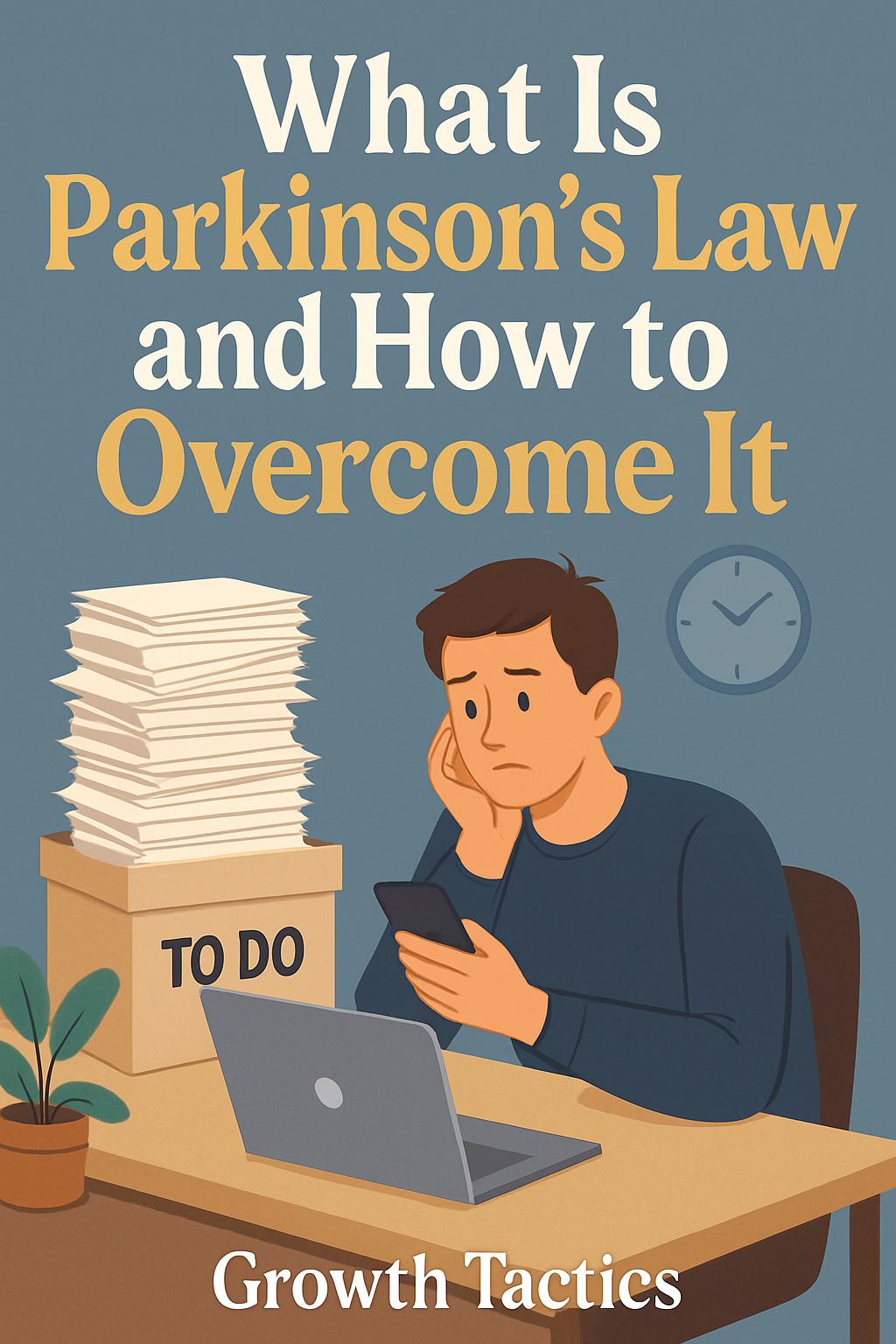I used to be a master of procrastination. I could make a two hour task take two weeks. It was a skill I did not want. Then I learned about Parkinson’s Law. This concept explains why this happens.
It changed everything for me. It gave me a name for my enemy. Parkinson’s Law states that work expands to fill the time available for its completion. This simple idea was a revelation. It explained years of my own behavior. It showed me why I always felt busy but not productive.
Understanding this simple law was the first step. It helped me improve my personal productivity. It allowed me to finally get things done. I stopped letting time control me. Instead I started to control my time.
This article will explain what the law is. It will share the exact strategies I used to overcome it. You can use these to improve your time management skills. You can get more done and feel less stressed. It is time to take back your schedule.
Jump To Section
Understanding How Work Expands to Fill the Time

The core idea of Parkinson’s Law is simple. The amount of time you have for a task determines how long it will take. If you have a lot of time you will use it all. This is true even for simple tasks. The work expands to fill the time you give it. This is a fundamental concept in time management.
The Origin of Parkinson’s Law
The concept was not created by a productivity guru. It was coined by Cyril Northcote Parkinson. He was a British naval historian and author.
He noticed that the bureaucracy grew regardless of the amount of work. The work itself seemed to become more complex. It always managed to fill the time of the growing staff. His observation suggests that work expands to fill the time.
Parkinson’s Law in Action
Let me give you a real world example. Imagine you have a report to write. Your boss tells you it is due in one month. The report should only take about ten hours of focused work. But you have a whole month.
So what happens next is a classic case of Parkinson’s Law in action. You do not start right away. The deadline is far away. There is no sense of urgency. You might spend the first week just thinking about it. You might over research the topic. You gather more data than you really need.
The task starts to feel bigger and more complex in your mind. In the second week you might create a detailed outline. You revise it over and over. You spend hours choosing the perfect font. You worry about small details that do not matter. The actual writing has not even started. The work is expanding.
Finally in the last week the deadline looms. A sense of urgency kicks in. You sit down and write the entire report in two days. You realize it was not that hard after all. The task that took a month could have been done in a week. The work expanded to fill the available time. I catch myself falling into this trap all the time and I’m sure many of you do too.
The Connection Between Parkinson’s Law and Procrastination
Parkinson’s Law and procrastination are close cousins. They feed off each other. Understanding this link is key to breaking the cycle. It helps you see why you procrastinate on certain tasks.
When a deadline is far away you have ample time. This lack of pressure is dangerous. It kills any sense of urgency. We tell ourselves we have plenty of time. So we put things off until later.
We fall into a psychological trap. We see all the extra time as a safety net. We think we can afford to wait. This thinking leads to wasted time and inefficient work. We delay starting the task at hand. Or we overthink it to the point of paralysis.
The task hangs over your head. It creates a low level of anxiety. You are not relaxing and you are not working. You are stuck in a state of productive limbo. This is why it is so important to combat Parkinson’s Law. It is not just about getting more done. It is about reducing your mental fatigue.
“Unleash the power of Parkinson’s Law and watch your productivity soar! Learn how to achieve more in less time with this inspiring blog post. [insert link] #ProductivityHacks #TimeManagement”
Key Strategies to Overcome Parkinson’s Law
Now you understand the problem. So how do you fix it?
The good news is there are clear strategies to overcome Parkinson’s Law. These are the time management strategies I used. They helped me stop letting work expand to fill the time. They are simple but incredibly effective.
Set Realistic Deadlines That Are Shorter

The first strategy to overcome Parkinson’s Law is simple. You must set self-imposed deadlines. And these deadlines should be shorter than you think. Do not give yourself a week for a two day task. Give yourself two days. Or maybe even one and a half.
You need to learn how to make realistic time estimates for completion. Then you shorten them slightly. This challenges you to work more efficiently. It forces you to focus on what is truly important. You do not have time for unnecessary perfectionism.
This creates a healthy sense of urgency. It is not the panic of a last minute deadline. It is a focused pressure that helps you stay on track.
You will be amazed at what you can accomplish. When you set a tight deadline you often meet it. The amount of work does not change. Your focus does. This is how you start to overcome Parkinsons Law.
Break Tasks Into Smaller Steps
A larger project can be very intimidating. When you look at a huge task it is easy to feel overwhelmed. This feeling often leads to procrastination. The work expands because you do not even know where to start. You spend more time worrying than working.
The solution is to break tasks into smaller steps. Take that big project and divide it. Turn it into a checklist of small manageable actions. Each small step should feel achievable. It should be something you can complete in a short amount of time.
This approach does two things. First it makes it much easier to start. You are not tackling a mountain. You are just taking one small step. Second it helps you prioritize tasks effectively. You can see the entire project laid out.
You can decide what needs to be done first. This is a powerful technique in your pursuit of progress. It keeps you moving forward.
Use Time Blocking to Manage Your Time
Time blocking is another powerful tool. It is a way to take control of your calendar. You allocate specific blocks of time to complete a task. During that block you work only on that one thing. No distractions. No multitasking.
When you set an amount of time to work on something you are more likely to stay focused. For example you might block out 90 minutes to write a report section. You know you only have that set amount of time. This forces you to use the time efficiently. You work with purpose.
This simple technique not only increases your productivity, it also helps reduce mental fatigue. You are not constantly switching between tasks. You give your full time and attention to the task at hand.
This is one of the best time management strategies. It helps you get more done in less time. It is a direct way to prevent work from expanding.
Clearly Define What Done Looks Like
Perfectionism is a major reason why work expands. We spend unnecessary time on a task. We tweak and polish it long after it is good enough. This is because we do not have a clear definition of completion. The finish line keeps moving.
Before you start any task define what done looks like. Be specific. What are the exact requirements to complete a task? Write them down. For a report it might be completing all sections and running a spell check. It is not about making every sentence perfect.
When you reach that predefined point you stop. This helps prevent work from expanding beyond its necessary scope. You learn to accept good enough. This is not about producing sloppy work. It is about using your time and attention wisely. You can then move on to the next important task.
Track How You Use Time
How can you set realistic deadlines if you do not know how long things take? Most of us are terrible at estimating time.
We either overestimate or underestimate the time needed to complete something. This is where time tracking comes in. To set realistic deadlines you need data.
Use a simple app or a notebook. For one week track how you use time. Be honest and detailed. This exercise will be eye opening. You will see where your time actually goes. You will identify your biggest time wasters.
This information is invaluable. It will help you make realistic time estimates. You will know exactly how much time to allocate for specific tasks. You can also see where you can work more efficiently. It is a small investment of time that pays huge dividends in personal productivity.
Apply the Law to Your Team
Parkinson’s Law does not just apply to individuals. It also affects teams and entire organizations. If a project has a loose deadline team members may take longer to complete their parts. The work will expand to fill the time allotted for its completion.
As a leader or manager you can combat this. You must set clear and concise deadlines for projects. Break the larger project down into smaller milestones. Each milestone should have its own deadline. This keeps the team focused and on track. Communicate these deadlines clearly. Ensure all team members understand the expectations.
This creates a sense of shared urgency. It helps the team use its time and resources well. When everyone is working efficiently the entire team becomes more productive. You can prevent the collective work to expand.
Conclusion
Understanding Parkinson’s Law is a game changer. It is the key to unlocking better personal productivity. It is a simple but profound concept. The main idea is that work expands to fill the time. So you must be the one to set limits on that time.
You cannot rely on external deadlines alone. You must be intentional about how you use your hours and days. This is the essence of effective time management. You can combat Parkinson’s Law. Use the time management strategies we discussed. Set shorter deadlines for yourself. Break down large tasks into smaller pieces. Use time blocking to dedicate focus to your work.
These simple actions will have a huge impact. As a former procrastinator I can tell you this works. Applying these principles changed how I approach my work. It helped me overcome the tendency to let work to expand. I get more done now than ever before. And I feel less stressed in the process.
I encourage you to try one of these strategies this week. Pick one that feels manageable. See what happens when you give yourself less time for a task. Start taking control of your time. You have the power to stop the expansion and start being truly productive.









